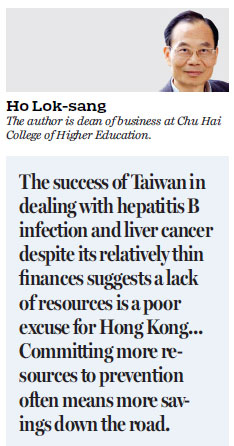Prevention is better, and cheaper, than cure for diseases
Updated: 2017-09-19 07:39
By Ho Lok-sang(HK Edition)
|
|||||||
Last week I had the occasion to watch a television feature story. It was about how Taiwan offers hepatitis B infection screening tests and then, for those diagnosed positive, health authorities offer follow-up tests that will continue for the rest of the lives of the infected residents. The purpose is to allow early discovery of malignant tumor development, so patients can be given life-saving intervention at the earliest time possible. Sadly for Hong Kong, our citizens do not enjoy similar services. Liver-cancer patients typically do not experience any symptoms that would prompt them to seek medical help until much too late; when symptoms occur so liver cancer is diagnosed, intervention is often too late. The luckier ones might receive a liver transplant but liver transplants are extremely costly and depend on availability of suitable livers. Even these luckier ones may not fully recover and must endure more pain and stress.
What really baffles me is that Hong Kong is economically much more advanced than Taiwan. Our GDP per capita last year stood at $43,528, whereas that of Taiwan was only $22,453, according to the International Monetary Fund. Our fiscal position is extremely strong, if not the strongest in the world, with surging fiscal reserves estimated at HK$860 billion at the end of March last year, equivalent to 24 months of government expenditures. We run budget surpluses most of the time but Taiwan has run a budget deficit almost every year in the past two decades.

Again sad to say, while Taiwan began a mass-vaccination program against hepatitis B, mainly by immunizing newborn infants from 1984, Hong Kong did not offer the vaccine to all new-borns until 1988. In 1984, the Hong Kong government did introduce a neonatal hepatitis B virus (HBV) vaccination program, but only infants considered at risk were covered.
It is certainly not through lack of knowledge that our health authorities kept lagging behind Taiwan in doing the right things, because we have top doctors and we have two medical schools that rank among the best globally. The only reason is that the authorities were trying to save money, and perhaps that is how we kept accumulating fiscal reserves. But prevention is better than cure. When prevention is not done properly we will have more infections, and we will have more infected people contracting liver cancer, and we will have more liver-cancer patients dying from the disease. Meanwhile, the medical costs of treating the infected and treating liver-cancer patients mount.
Hepatitis B virus infection detection and follow-up medical attention is only one example of Hong Kong failing to observe the dictum "prevention is better than cure". Another area in which we failed badly is providing preventive mental-health services. From time to time the community is hit by tragedies involving mental-health patients or ex-patients who need help but because of all kinds of reasons do not receive it. A South China Morning Post editorial last year cited alarming figures. The wait for mental-health treatment was as long as 166 weeks, or more than three years. Our psychiatric doctor-patient ratio is only 4.5 per 100,000 people. "The number of new psychiatric cases in specialist public outpatient clinics has grown by about 8,000 a year to 47,958 in the past five years. The Hospital Authority puts the number with severe conditions anywhere between 70,000 and 200,000, a frighteningly rubbery estimate." As a result of the failure of the preventive effort, from time to time tragedies occur.
The success of Taiwan in dealing with hepatitis B infection and liver cancer despite its relatively thin finances suggests a lack of resources is a poor excuse for Hong Kong. Somehow our bureaucrats have their hands tied by their own thinking. Committing more resources to prevention often means more savings down the road. The savings come in different forms, and are sometimes not entirely transparent. It is great that we have finally made vaccinations available for all infants. As a result of that we are having fewer infections and are saving the money that would be needed to treat infections. Fewer infections mean a healthier and more productive workforce and more profitable enterprises. Fewer infections also mean less need for the community and families to attend to patients. As stated in an article on the subject, in addition to screening and vaccination, ideal programs must offer access to ongoing care and support, including antiviral therapy and screening for liver cancer. If the government takes good preventive care of patients, it sets an example for the community. The government may well win more support from the community. More savings will come because it runs into fewer objections and has more support.
To sum up: The government needs to set its priorities right. Preventive care will save money and save lives, and contribute to a happier community.
(HK Edition 09/19/2017 page8)